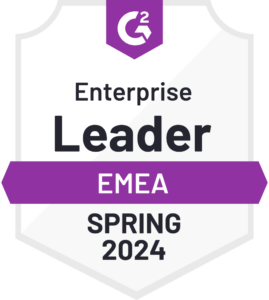Best Practices for Evaluating and Selecting a Financial Close Software
Blog post
Share
Information Overload.
We’ve all been there, and it isn’t fun. Unfortunately, when you’re in the market for a new software product to fulfill a key business need, it usually comes with a great amount of information overload. In today’s highly competitive environment, there are hundreds of options out there. More often than not, we hear from clients that once they start to look across different solutions, they all begin to look the same.
This brings on the risk of choosing a product that is not the right fit for your company, only to be abandoned later down the road. This can cost your company both time and money, leaving you in an even worse position than when you started.
Therefore, when it comes to evaluating a financial close solution and implementation partner, there are three things that you need to keep in mind:
- Focus on the challenges you are facing today. Is this a technology, process, or people challenge?
- Focus on your resources and preparation. Align and prioritize your challenges from highest priority to lowest priority, and then focus on who can help you solve these issues. Do you have internal resources, or do you need an implementation partner that can help you drive your evaluation process?
- Focus on the bottom line. Obtain all the data points to make your decision. Focus on getting a tailored demo, best and final pricing options, and an implementation partner that brings tools to accelerate your implementation journey.
Focus on Challenges You Are Facing Today
Understand Your Current State Challenges
Focus on the issue at hand and drill into the details of what is making this issue painful for your finance and accounting team. For example, are you able to close your Accounts Payables sub-ledger in one business day? If the answer is no, understand if this problem is related to the volume of transactions someone needs to match and complete. Alternatively, is this related to accruing your expenses on time? If the answer is yes, then what are the reasons that the accounting team can’t perform monthly accruals?
Map Out Current State Processes
Talk to different departments and your team to fully understand their obstacles and the process improvements they aspire to bring into the business. For example, are all expenses submitted on time from business operations? Is the accounting team waiting on important information to complete their work? If the answer is no, then focus on understanding the different roles and responsibilities throughout the process and uncover any dependencies.
Consider what isn’t working and how it could be improved. By identifying the problems that you want to fix, you can pinpoint business requirements, making it easier to select a technology solution and features that will prove both relevant and helpful in your selection process.
Focus on Your Resources and Preparation
Prepare a Prioritization List
This is the point in time where it’s important to identify which challenges you can fix on your own and which challenges need technology to create efficiencies. For example, in most cases, having a month-end-close checklist in Excel is great, but using a technology solution will allow you and the team to gain visibility, centralization, and standardization to increase efficiency on your month-end-close process.
Once you prioritize your challenges, those that are the highest priority will become must-have features that a technology solution needs to have as part of your selection process. This will allow you to differentiate technology limitations across vendors. For example, having multiple bank accounts is a business requirement for the business, but then it becomes time-consuming for the accounting team to reconcile each bank account on a monthly basis. In this case, automating bank reconciliations will become a must-have feature for technology vendors to showcase and demo for you.
There are multiple cases where small- to mid-sized companies don’t have the privilege to focus on other internal projects, or they spend a lot of time up front to drill down into process issues or documentation and identify how the process should be completed in the future. This task becomes daunting when you also have to support your accounting operation’s responsibilities.
When in these situations, we have seen accounting firms like Citrin Cooperman getting involved with small- to mid-sized companies to expedite the evaluation process, use the correct accounting tools to identify and document issues, and layout the future state of your business. In a real business case example, Citrin Cooperman worked with a northeast agriculture company and their small accounting team to identify their challenges, prepare business requirements, and get ready for demos with selected vendors, effectively reducing the amount of time spent by the accounting team.
Focus on the Bottom Line
Method of Evaluation
The majority of software solutions offer a personalized demo. Make sure that at this point you have identified your top-priorities and must-have features that you want to evaluate. Create a clear list of what you need to see during the demo so that, at the end of the demo, you can determine whether the functionality of the platform fits your needs. Ask for customer references and published case studies. Another avenue to evaluate is social media — including Facebook and LinkedIn — for independent references and opinions.
The Business Case for Change
The next step is tying your needs and vision to an expected return on investment (ROI). Laying out the process of how your organization operates today, the time required for each process, and the resources required to complete each process will give you a baseline to calculate the ROI and payback. For example, today it takes my team 30 minutes to prepare and complete a bank reconciliation; can the technology solution streamline this process to 15 minutes?
Choosing the Right Implementation Partner
There are many things to evaluate when choosing a financial close solution. Price is often a top priority, but it’s not always the most important criteria. It’s important to identify an implementation partner who will have skin in the game to ensure your project is successful from day one.
When looking for implementation partners, be sure to ask if they are equipped with accelerators, which are accounting tools used to get your team up and running quickly. Accelerators can help train your team on how the process needs to be prepared and completed while using software. More often than not, we see clients delaying their implementations due to the lack of process definition within the company. For example, balance sheet account reconciliation is a critical process that most companies don’t spend much time on but requires an additional level of scrutiny when implementing a financial close solution.

As part of this article, we are sharing a sample of a month-end-close checklist to demonstrate the types of accelerators implementation partners like Citrin Cooperman can bring to accelerate your implementation journey.
Choosing the Right Solution
After you have gone through the steps above, the approach to a financial close technology selection process can be distinguished across vendors. One of the things that you will notice is that Adra is built for small- and mid-sized companies. Its intuitive design ensures that each product is easy to learn and use.
Since the entire suite of solutions is centrally hosted in the cloud, you can take advantage of our software-as-a-service (SaaS) solution that is rapidly implemented, has a lower cost than traditional software deployment, and is scalable. Additionally, the three products within the Adra Suite work together to automate and streamline work, improve accuracy, reduce risk, and better manage the detailed processes handled by the Office of Finance.
Settling for average just isn’t good enough when choosing your new software. By making sure you know what your goals are and that the solution you choose helps you achieve those goals, you’ll be on the path to selecting the right solution in no time.
Set a Due Date for a Final Decision
One of the greatest mistakes companies make when they are evaluating software is that they don’t have a clear timeline for when a decision needs to be made. There never will be a “right time” or a “slow time.” One of the most important decisions you could make to move your business forward is determining a deadline and sticking to it. Announce your deadline early and communicate it to all stakeholders so that everyone is held accountable.
Remember to focus on the long term, not the short term; it’s easy to get caught in the mentality of thinking short term and choosing the most immediately beneficial option, with little regard to the long-term potential. Achieving a valuable return on investment when investing in a financial automation solution occurs when planning the future growth of your organization.
Every minute you spend running your company with an inefficient system costs you time and money.
About Citrin Cooperman
Citrin Cooperman is among the largest, full-service assurance, tax, and business advisory firms in the United States, having steadily built its business serving a diverse and loyal clientele since 1979. Our daily mission is to help our clients “focus on what counts.” Rooted in our core values, we provide a comprehensive, integrated business approach to traditional services, which includes proactive insights throughout the lifecycle of our clients wherever they do business, across the globe. Citrin Cooperman is an independent firm associated with Moore Stephens International Limited.
About The Author
Carlos A. Catalan is a Director at Citrin Cooperman, where he leads the Strategy and Business Transformation practice identifying game-changing middle market companies that are striving to create value and improve their finance operating models. Prior to Citrin Cooperman, Carlos stood up multiple service offerings within finance leveraging the latest digital technology disruptors and modifying the go-to-market strategy with top technology and software companies.
Carlos A. Catalan
Director | Strategy & Business Transformation
ccatalan@citrincooperman.com | (914) 949-2990 x3446









